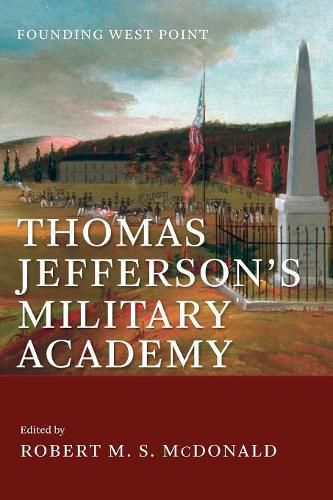Readings Newsletter
Become a Readings Member to make your shopping experience even easier.
Sign in or sign up for free!
You’re not far away from qualifying for FREE standard shipping within Australia
You’ve qualified for FREE standard shipping within Australia
The cart is loading…






This title is printed to order. This book may have been self-published. If so, we cannot guarantee the quality of the content. In the main most books will have gone through the editing process however some may not. We therefore suggest that you be aware of this before ordering this book. If in doubt check either the author or publisher’s details as we are unable to accept any returns unless they are faulty. Please contact us if you have any questions.
Why did Thomas Jefferson, who claimed to abhor war and fear standing armies, in 1802 establish the United States Military Academy? For more than two centuries this question has received scant attention, despite the significant contributions of both Jefferson and West Point to American history.
Thomas Jefferson’s Military Academy is the most comprehensive treatment to date of the origins, purposes, and legacies of Jefferson’s school on the cliffs above the Hudson River. In a series of essays, an interdisciplinary group of military historians, legal and constitutional scholars, and experts on Jefferson’s thought challenge the conventional wisdom that the third president’s founding of the academy should be regarded as accidental or ironic. Although Jefferson feared the potential power of a standing army, the contributors point out he also contended that
whatever enables us to go to war, secures our peace.
They take a broad view of Jeffersonian security policy, exploring the ways in which West Point bolstered America’s defenses against foreign aggression and domestic threats to the ideals of the American Revolution.Written in clear and accessible prose, Thomas Jefferson’s Military Academy should appeal to scholars and general readers interested in military history and the founding generation.
Contributors: Peter S. Onuf, University of Virginia; Don Higginbotham, University of North Carolina, Chapel Hill; David N. Mayer, Capital University Law School; Elizabeth D. Samet, United States Military Academy; Theodore J. Crackel, East Stroudsburg University of Pennsylvania; Jennings L. Wagoner Jr., University of Virginia; Christine Coalwell McDonald, Storm King School; Samuel J. Watson, United States Military Academy; Robert M. S. McDonald, United States Military Academy; Jean M. Yarbrough, Bowdoin College.
$9.00 standard shipping within Australia
FREE standard shipping within Australia for orders over $100.00
Express & International shipping calculated at checkout
This title is printed to order. This book may have been self-published. If so, we cannot guarantee the quality of the content. In the main most books will have gone through the editing process however some may not. We therefore suggest that you be aware of this before ordering this book. If in doubt check either the author or publisher’s details as we are unable to accept any returns unless they are faulty. Please contact us if you have any questions.
Why did Thomas Jefferson, who claimed to abhor war and fear standing armies, in 1802 establish the United States Military Academy? For more than two centuries this question has received scant attention, despite the significant contributions of both Jefferson and West Point to American history.
Thomas Jefferson’s Military Academy is the most comprehensive treatment to date of the origins, purposes, and legacies of Jefferson’s school on the cliffs above the Hudson River. In a series of essays, an interdisciplinary group of military historians, legal and constitutional scholars, and experts on Jefferson’s thought challenge the conventional wisdom that the third president’s founding of the academy should be regarded as accidental or ironic. Although Jefferson feared the potential power of a standing army, the contributors point out he also contended that
whatever enables us to go to war, secures our peace.
They take a broad view of Jeffersonian security policy, exploring the ways in which West Point bolstered America’s defenses against foreign aggression and domestic threats to the ideals of the American Revolution.Written in clear and accessible prose, Thomas Jefferson’s Military Academy should appeal to scholars and general readers interested in military history and the founding generation.
Contributors: Peter S. Onuf, University of Virginia; Don Higginbotham, University of North Carolina, Chapel Hill; David N. Mayer, Capital University Law School; Elizabeth D. Samet, United States Military Academy; Theodore J. Crackel, East Stroudsburg University of Pennsylvania; Jennings L. Wagoner Jr., University of Virginia; Christine Coalwell McDonald, Storm King School; Samuel J. Watson, United States Military Academy; Robert M. S. McDonald, United States Military Academy; Jean M. Yarbrough, Bowdoin College.